Raspberries: beneficial properties of the berry and possible harm
Tasty, aromatic and incredibly healthy raspberries are among the most popular berries all over the world. This is facilitated by low calorie content, a rich vitamin-mineral complex, and the ability to be consumed fresh or canned. The fruits, leaves and branches of the bush are used in folk medicine and home cosmetology.
In the article we will talk about the health benefits and harms of raspberries, their use in dietary nutrition and contraindications for consumption.
Calorie content and nutritional value of raspberries
According to the botanical classification, the raspberry fruit is not exactly a berry, but a polydrupe, consisting of many drupes fused together. They are attached to the white stalk and gather around it into a rounded head. However, in everyday life, raspberries are called a berry - there is no big mistake in this.
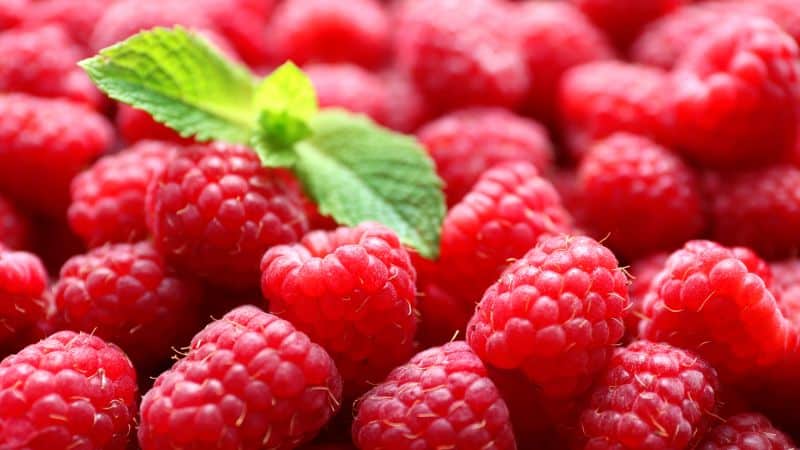
How many calories are in raspberries? Nutritional value of 100 g of product:
- calorie content – 52 kcal;
- proteins – 1.2 g;
- fats – 0.65g;
- carbohydrates – 5.44 g;
- fiber – 6.5 g;
- water – 85.75 g;
- ash – 0.46 g.
Glycemic index and bread units
The glycemic index (GI) shows how quickly certain foods raise blood sugar levels. Tracking GI is recommended for people with diabetes.
The GI of raspberries is 25-40 units, depending on varieties.
XE of fresh raspberries – 0.67 g.
Reference. The bread unit or carbohydrate unit (XU) is used to roughly estimate the carbohydrate content of foods. One XE = 10 g excluding fiber or 12 g of carbohydrates or 20 g of bread.Knowing the XE of different foods allows you to control sugar levels and improve carbohydrate metabolism.
Raspberries contain malic acid. It accelerates the absorption of carbohydrates and lowers glucose levels. Therefore, doctors recommend including raspberries in the diet of patients who are in a prediabetic state. You are allowed to eat ½ cup of berries at one time.
Chemical composition and vitamin content of raspberries
What vitamins are contained in raspberries? The table shows the vitamin and mineral composition of 100 g of fresh fruits.
| Name | Content | Norm |
| Vitamin A | 2 mcg | 900 mcg |
| alpha carotene | 16 mcg | — |
| beta carotene | 0.012 mg | 5 mg |
| Lutein and Zeaxanthin | 136 mcg | — |
| Vitamin B1 | 0.032 mg | 1.5 mg |
| Vitamin B2 | 0.038 mg | 1.8 mg |
| Vitamin B4 | 12.3 mg | 500 mg |
| Vitamin B5 | 0.329 mg | 5 mg |
| Vitamin B6 | 0.055 mg | 2 mg |
| Vitamin B9 | 21 mcg | 400 mcg |
| Vitamin C | 26.2 mg | 90 mg |
| Vitamin E | 0.87 mg | 15 mg |
| beta tocopherol | 0.06 mg | — |
| gamma tocopherol | 1.42 mg | — |
| delta tocopherol | 1.04 mg | — |
| Vitamin K | 7.8 mcg | 120 mcg |
| Vitamin PP | 0.598 mg | 20 mg |
| Betaine | 0.8 mg | — |
| Potassium | 151 mg | 2500 mg |
| Calcium | 25 mg | 1000 mg |
| Magnesium | 22 mg | 400 mg |
| Sodium | 1 mg | 1300 mg |
| Sulfur | 12 mg | 1000 mg |
| Phosphorus | 29 mg | 800 mg |
| Iron | 0.69 mg | 18 mg |
| Manganese | 0.67 mg | 2 mg |
| Copper | 90 mcg | 1000 mcg |
| Selenium | 0.2 mcg | 55 mcg |
| Zinc | 0.42 mg | 12 mg |
| Mono- and disaccharides | 4.42 g | 100 g |
| Glucose | 1.86 g | — |
| Sucrose | 0.2 g | — |
| Fructose | 2.35 g | — |
| Saturated fatty acids | 0.019 g | 18.7 g |
| Palmitic | 0.016 g | — |
| Stearic | 0.004 g | — |
| Monounsaturated fatty acids | 0.064 g | min 16.8 g |
| Oleic (omega-9) | 0.059 g | — |
| Gadoleic (omega-9) | 0.005 g | — |
| Polyunsaturated fatty acids | 0.375 g | from 11.2 to 20.6 g |
| Linoleic | 0.249 g | — |
| Linolenic | 0.126 g | — |
| Omega-3 fatty acids | 0.126 g | from 0.9 to 3.7 g |
| Omega-6 fatty acids | 0.249 g | from 4.7 to 16.8 g |
What are the benefits of raspberries?
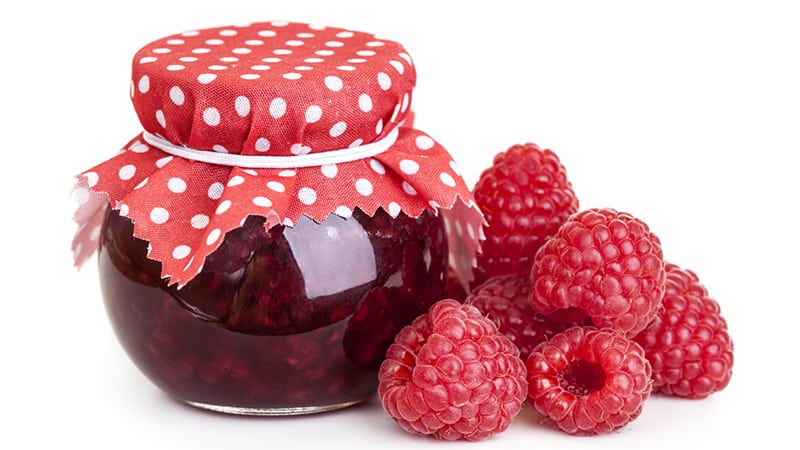
The beneficial properties of fresh raspberries are due to their rich chemical composition. Regular consumption of fruits is beneficial for:
- Joints – salicylic acid has an anti-inflammatory effect. It is most effective at the first signs of arthrosis and arthritis.
- Of cardio-vascular system – magnesium and ascorbic acid cleanse blood vessels, remove cholesterol, normalize heart function, and lower blood pressure.
- Nervous system - vitamin-mineral complex, flavonoids and sugars eliminate stress and anxiety, improve memory, and elevate mood.
- Respiratory system – raspberries have an expectorant effect and help remove phlegm and mucus from the bronchi and lungs.
- Gastrointestinal tract – pectin and fiber normalize digestion, enhance intestinal motility, and ketone helps reduce weight.
- Pancreas – natural sugar and the low glycemic index of sugar do not provoke sudden surges in blood sugar; on the contrary, they maintain its normal level.
- Reproductive system – zinc, vitamins B9 and E have a beneficial effect on the reproductive system, take part in the synthesis of sex hormones, and improve the well-being of women during menopause. Antioxidants prevent male infertility. Magnesium and Vitamin C and magnesium increase testosterone and male fertility.
- Skin – vitamins A and E prevent premature aging of the skin, soften it, increase elasticity, and maintain a healthy complexion.
- Immune system – flavonoids, minerals and vitamins strengthen the immune system, bind free radicals, and increase resistance to viruses during the cold season.
Important! Just 10-15 raspberries per day reduce the risk of cancer and atherosclerosis by 45%.
Medicinal properties
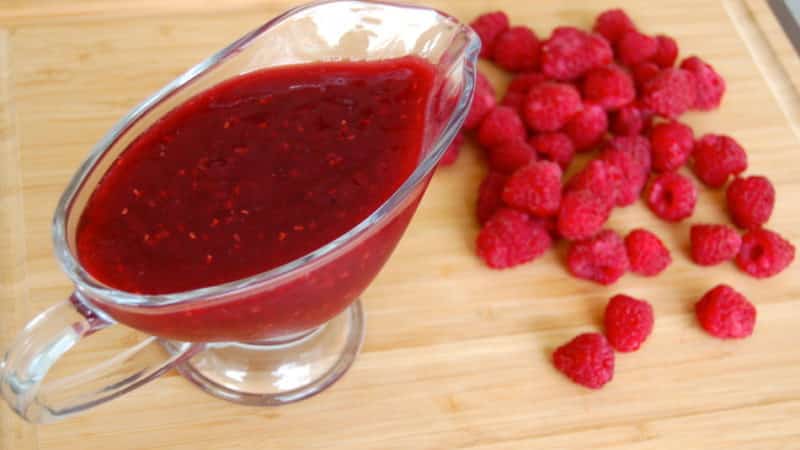
Raspberry tea and raspberry puree, prepared without subsequent pasteurization, cause increased sweating during a cold. Body temperature drops faster and the healing process takes less time.
Raspberries are useful for high blood pressure, gastrointestinal diseases and anemia.
The fruits are used as an expectorant for bronchitis and laryngitis.
This is interesting:
Application of raspberries
Raspberry fruits are used not only in cooking, but also in folk medicine, home cosmetology, and are included in weight loss diets.
In folk medicine
Traditional healers consider raspberries to be one of the healthiest berries. Previously, it was used to treat rubella, urticaria, leprosy, skin ulcers, itching and lichen. Nowadays roots are used as raw materials, leaves, bush branches, and, of course, fruits.
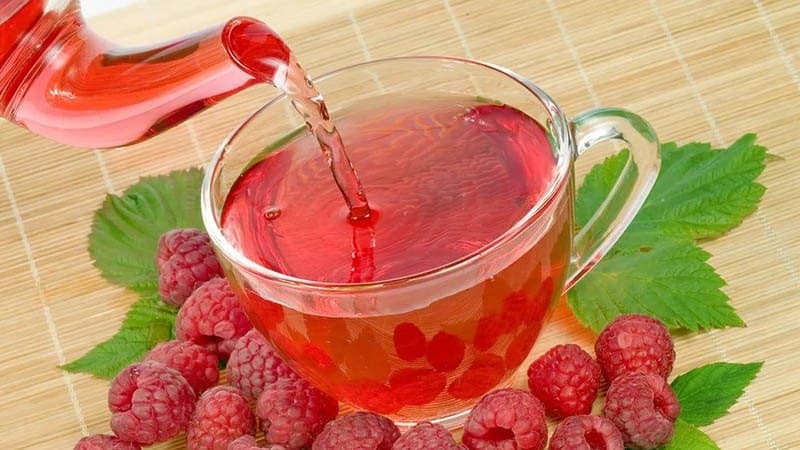
Indications for use:
- upper respiratory tract diseases;
- diarrhea;
- skin inflammation, teenage acne;
- disruption of blood outflow and blockage of the lumen of blood vessels;
- haemorrhoids;
- prostatitis and impotence in men;
- infertility;
- rheumatic pains;
- fever;
- gastritis and enteritis;
- inflammatory eye diseases (blepharitis, conjunctivitis).
In cosmetology
Raspberries have a beneficial effect on the skin from the outside and inside. American dermatologist Nicholas Perricone has developed an entire anti-aging system called Face Lift Diet. Its essence is to fight free radicals with the help of antioxidants contained in fruits, and at the same time exclude from the diet foods that contribute to the formation of free radicals.
The Perricon system helps fight eczema, psoriasis, dermatitis and early skin aging.
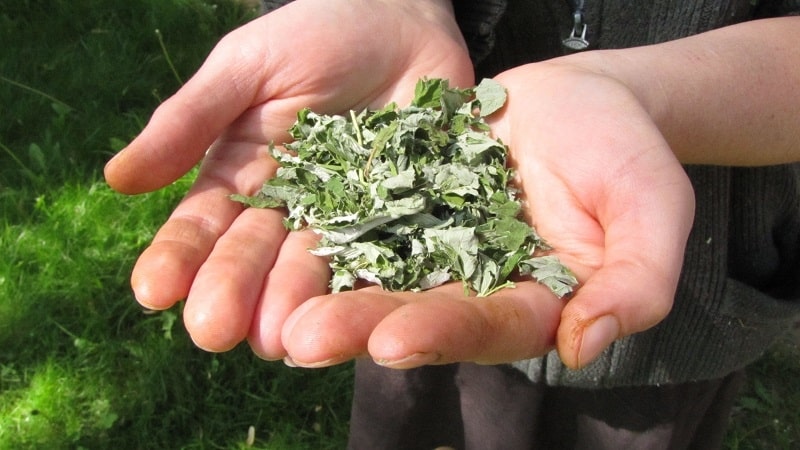
In everyday life, freshly picked raspberry leaves are used to eliminate acne and acne. The raw materials are ground until smooth and applied to the skin. After 15 minutes, wash off and dry your face with light pats of your fingers.
Whitening, nourishing and softening masks are prepared from the fruits.

Nourishing and cleansing homemade lotions are popular. To do this, take 1 tbsp. l. berries, pour 250 ml of vodka and leave to brew in a dark place for 1.5 weeks. Before use, the lotion is diluted with water by 1/2 or 2/3.
Raspberry ketone has become popular recently. This phenolic compound of natural origin is the main component of essential oil, giving it a recognizable aroma.
It is sold in the form of a finely crystalline white powder, packaged in 5 g - 1 kg. Ketone dissolves well in hot oil, alcohol, and squalane. The substance has a fat-burning effect, increases skin elasticity, improves turgor, narrows pores, activates metabolic processes, produces a powerful rejuvenating effect, strengthens hair follicles and stimulates hair growth.
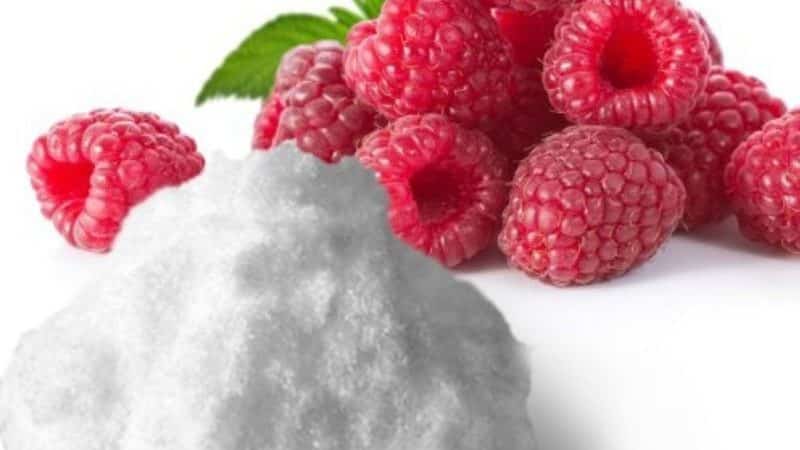
Ketone is found in cosmetics for the face (0.5%) and eyelashes (0.01%), masks and shampoos (1-2%), anti-cellulite serums and wraps (1%).
Raspberry ketone is practically insoluble in water, so it is better to prepare homemade cosmetics using an alcohol base:
- To prepare a 2% solution, 2 g of ketone are dissolved in 98 g of alcohol.
- To prepare a 5% solution, 2.5 g of powder is dissolved in 47.5 g of alcohol.
- To prepare a 10% solution, 10 g of ketone is dissolved in 90 g of alcohol.
It is important to maintain exact proportions: keep in mind that 98 g of alcohol does not equal 98 ml.
Prepared remedy stored in the refrigerator and added to cosmetic products if necessary. Dosage 5% per 50 ml lotion or cream:
- 0.01% - 1 drop of solution;
- 0.05% - 5 drops;
- 0.1% – 10 drops;
- 1% - 100 drops.
For weight loss
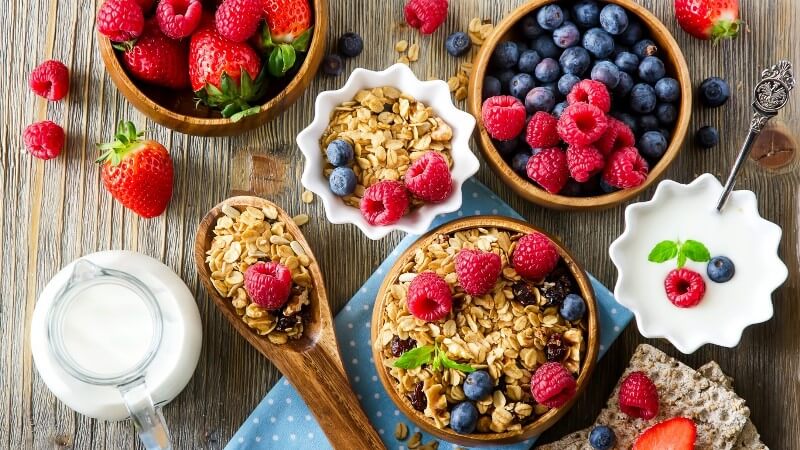
Fresh raspberries with their 52 kcal are often included in weight loss menus. In the bakery industry, raspberry flour is used to reduce the calorie content of finished products and improve their taste. Fruits of milky and technical ripeness are suitable for its preparation. They are dried in the sun and then in an oven, where they acquire a grayish tint but retain their aroma. Dried raspberries are ground into flour and added to the dough. Flour retains minerals and fiber. Such products are in demand among people who control their weight and are on a strict diet.
Some studies suggest increased metabolic activity due to raspberry ketones. However, many experts argue that this is just a marketing ploy, and there is still no evidence of the real effect of these compounds on body weight.
American nutritionist Elsa Savage suggests replacing flour products and fruits (bananas, grapes, melon, mango) with raspberries, which neutralize the effect of weight loss diets.
Raspberries do not promote weight loss, but they allow you to maintain it at the desired level. The fruits contain fiber, have low calorie content, GI and XE, and have a diuretic effect, thereby helping to remove excess fluid from tissues.
Harm and contraindications
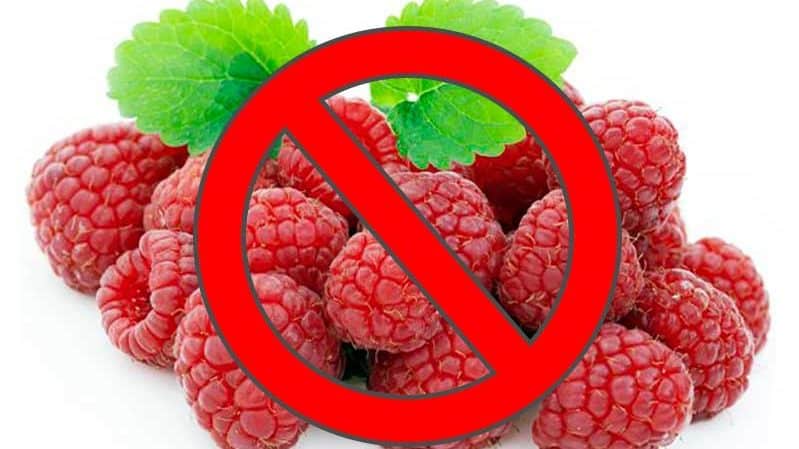
Eating large quantities of berries is contraindicated in case of gout, gallbladder and kidney dysfunction, or allergies to the product.
In the course of research, scientists were able to establish a connection between the frequent use of raspberry infusions and decoctions with suppression of pituitary and thyroid function. This effect is explained by the content of substances with a hormonal effect.
During the period of exacerbation of gastritis, ulcerative lesions of the duodenum, stomach, gastritis, it is recommended to refrain from eating berries due to the presence of coarse fiber.
People taking blood thinners will need to consult a doctor because raspberries contain large amounts of vitamin K, which affects blood composition.
Conclusion
The calorie content of fresh raspberries per 100 g is only 52 kcal, which allows you to consume them on a diet without fear. The benefits of raspberries are due to their rich chemical composition. Ascorbic acid, potassium, magnesium, B vitamins contribute to the overall strengthening of the body, help cope with colds, upper respiratory tract diseases, bronchitis, eczema and dermatitis.
Berries can be harmful, especially during exacerbation of ulcers and gastritis. Direct contraindications for use are gout, allergies and gallbladder pathologies.